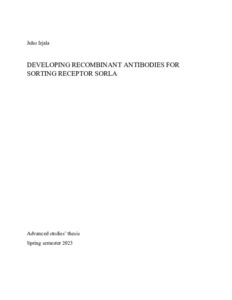DEVELOPING RECOMBINANT ANTIBODIES FOR SORTING RECEPTOR SORLA
Irjala, Juho (2023-02-02)
DEVELOPING RECOMBINANT ANTIBODIES FOR SORTING RECEPTOR SORLA
Irjala, Juho
(02.02.2023)
Julkaisu on tekijänoikeussäännösten alainen. Teosta voi lukea ja tulostaa henkilökohtaista käyttöä varten. Käyttö kaupallisiin tarkoituksiin on kielletty.
avoin
Julkaisun pysyvä osoite on:
https://urn.fi/URN:NBN:fi-fe2023021326996
https://urn.fi/URN:NBN:fi-fe2023021326996
Tiivistelmä
Breast cancer is the most common malignancy and the leading cause of cancer-related death
among women. About 15 to 20% of breast cancers has amplification of the HER2 oncogene.
HER2 is a member of the epidermal growth factor receptor (EGFR) family that promotes cell
survival, proliferation, motility, and resistance to apoptosis. Despite many advances in
treatment options targeting HER2, anti-HER2 therapy resistance remains a relevant issue.
SorLA is a sorting receptor of the vacuolar protein sorting 10 proteins (vps10p) domain
receptor family, a family of sorting receptors transporting cargo between cell surface and
intracellular compartments such as the trans-Golgi network, endosomes, and lysosomes. A
link between HER2 cancer signaling and the expression of SorLA has recently been
discovered. SorLA was shown to promote HER2 recycling by preventing its lysosomal
degradation. Depletion of SorLA decreased HER2 signaling, promoted HER2’s
accumulation in dysfunctional lysosomes and sensitized the cancer cells to a lysosometargeting cationic amphiphilic drug ebastine. High SorLA expression correlated with poor
patient outcomes in HER2-amplified breast cancer patients. These findings make SorLA an
attractive target for drug therapy.
The aim of this study was to develop anti-SorLA antibody fragments (binders), the most
promising of which will later be developed into a full-length humanized anti-SorLA antibody
ultimately testable in patients. The binders were developed using phage display targeting
either full-length SorLA or its binding domain. In the first round 576 clones were screened.
In the second round 68 clones were screened and subsequently sequenced, producing 41
different sequences. These most promising 34 clones were then used to immunoprecipitated
SorLA to further test for binding activity. Out of these 34 binders 23 successfully
immunoprecipitated SorLA. The most promising clones will be tested in vitro in HER2
positive cancer cell lines to assess their cancer growth -halting capabilities. The most
successful clone will be developed into a full-length human antibody that can be tested in
patients.
among women. About 15 to 20% of breast cancers has amplification of the HER2 oncogene.
HER2 is a member of the epidermal growth factor receptor (EGFR) family that promotes cell
survival, proliferation, motility, and resistance to apoptosis. Despite many advances in
treatment options targeting HER2, anti-HER2 therapy resistance remains a relevant issue.
SorLA is a sorting receptor of the vacuolar protein sorting 10 proteins (vps10p) domain
receptor family, a family of sorting receptors transporting cargo between cell surface and
intracellular compartments such as the trans-Golgi network, endosomes, and lysosomes. A
link between HER2 cancer signaling and the expression of SorLA has recently been
discovered. SorLA was shown to promote HER2 recycling by preventing its lysosomal
degradation. Depletion of SorLA decreased HER2 signaling, promoted HER2’s
accumulation in dysfunctional lysosomes and sensitized the cancer cells to a lysosometargeting cationic amphiphilic drug ebastine. High SorLA expression correlated with poor
patient outcomes in HER2-amplified breast cancer patients. These findings make SorLA an
attractive target for drug therapy.
The aim of this study was to develop anti-SorLA antibody fragments (binders), the most
promising of which will later be developed into a full-length humanized anti-SorLA antibody
ultimately testable in patients. The binders were developed using phage display targeting
either full-length SorLA or its binding domain. In the first round 576 clones were screened.
In the second round 68 clones were screened and subsequently sequenced, producing 41
different sequences. These most promising 34 clones were then used to immunoprecipitated
SorLA to further test for binding activity. Out of these 34 binders 23 successfully
immunoprecipitated SorLA. The most promising clones will be tested in vitro in HER2
positive cancer cell lines to assess their cancer growth -halting capabilities. The most
successful clone will be developed into a full-length human antibody that can be tested in
patients.
